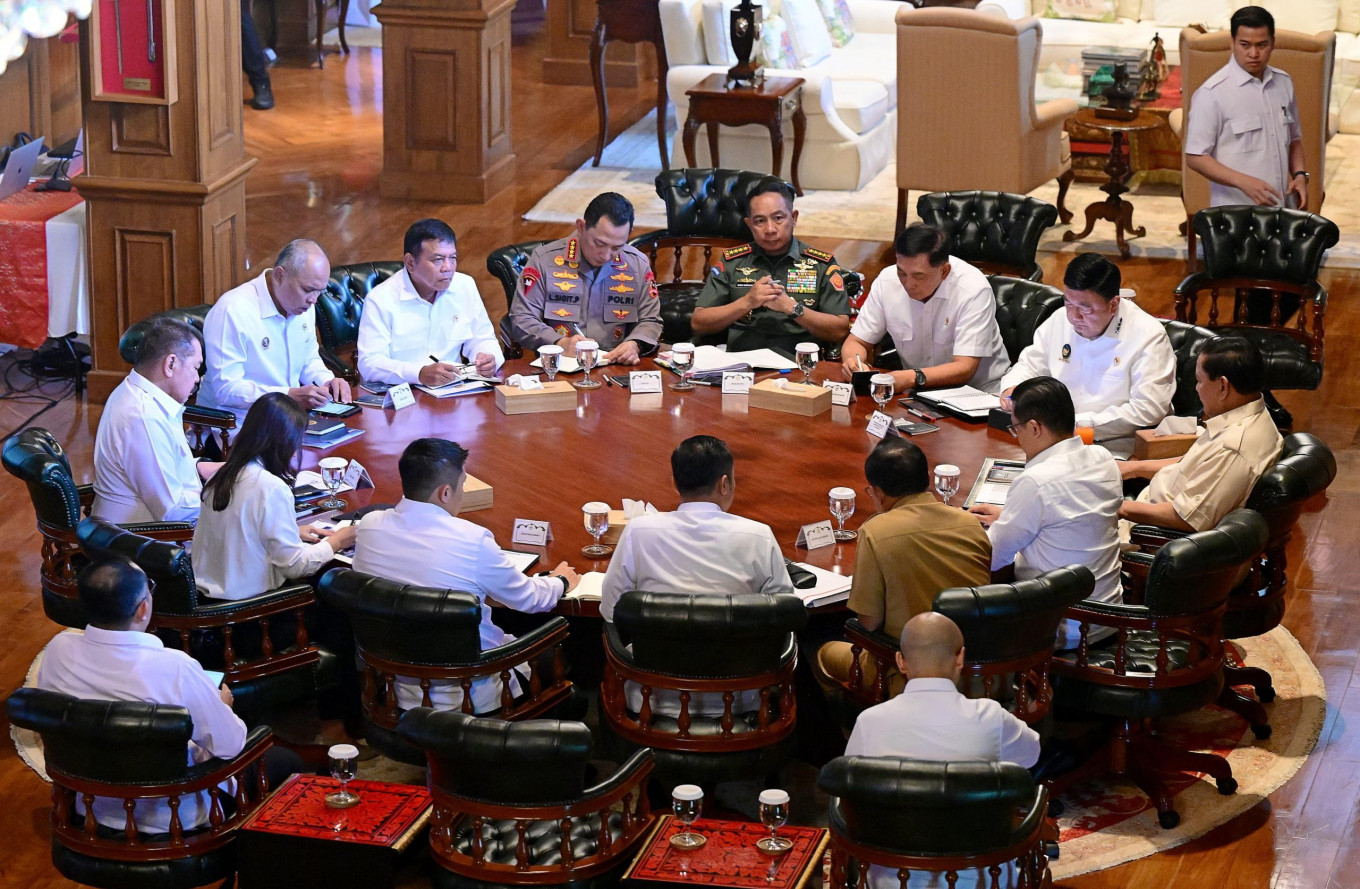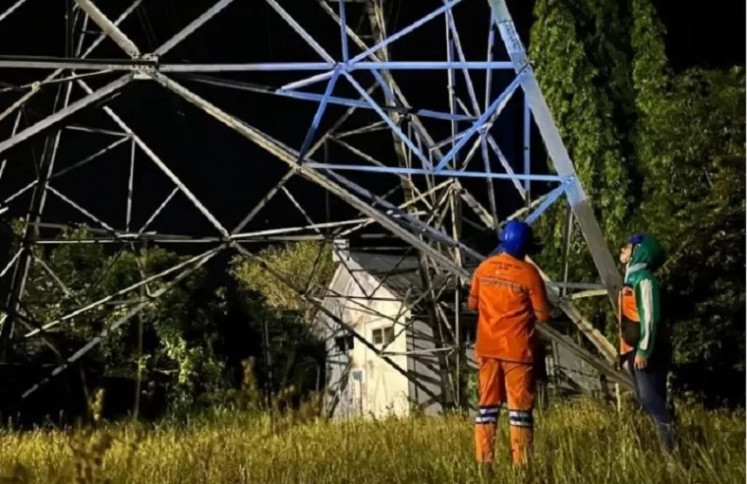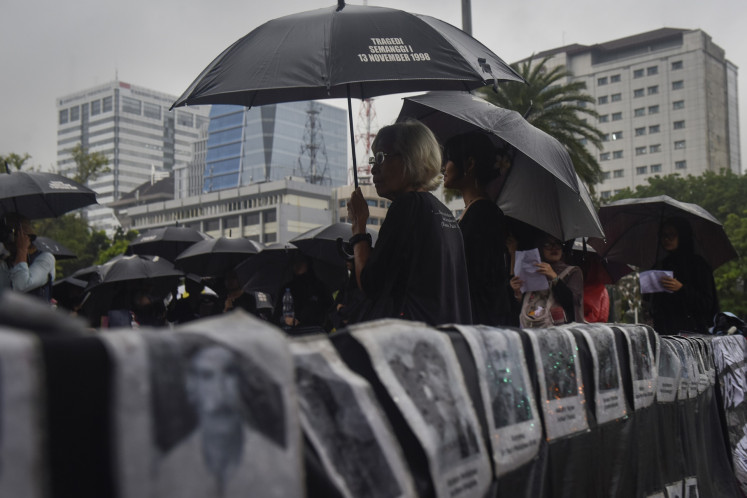Popular Reads
Top Results
Can't find what you're looking for?
View all search resultsPopular Reads
Top Results
Can't find what you're looking for?
View all search resultsIndonesia's future: Adapt, act, and lead with feedback
It is time for Indonesia to throw out outdated, hypercautious leadership models and adopt a relexive approach with an experimentation mindset that embraces a feedback culture to harness the very pluralism that defines the country's identity.
Change text size
Gift Premium Articles
to Anyone
I
ndonesia faces a pivotal moment. In an era of geopolitical flux, trade fragmentation and shifting economic power, the challenge isn't if change is coming, but how swiftly and skillfully the nation adapts. The predictable paths to growth are gone, replaced by a contested, uncertain landscape. For Indonesia, it is no longer about catching up, but about staying resilient amid the storm.
The traditional responses of waiting for clarity, rigid five-year plans and avoiding bold moves are now liabilities. As The Economist highlights, success today demands pace and resilience, not perfection.
Rich in human capital and strategically positioned in ASEAN, Indonesia can't cling to outdated leadership models. From policymaking to corporate governance, a fundamental shift is needed: from control to coordination, positional authority to adaptive capability, and command to feedback. This is crucial for a young, vibrant democracy still building its national identity. Today's leadership decisions will shape both economic trajectories and societal cohesion.
This article proposes a reimagined leadership ethos for Indonesia’s future, drawing on leadership research, macroeconomic thinking and emerging market realities.
In a fluid world of constant technological shifts and volatile alliances, strategy cannot be a rigid prediction. It must act as a compass, anchoring institutions in values and direction while allowing flexibility.
Our observations across East Asia show that resilient firms exhibit "adaptive coherence": They understand their purpose, and are unafraid to change how they pursue it. This aligns with emergent strategy, where organizations learn and adapt dynamically, not just at annual retreats.
The country’s leaders need a new literacy: the ability to read weak signals, interpret localized data and respond to shifting constraints. For Indonesia's green economy, no master plan will predict breakthroughs, but flexible coordination, modular investments and local feedback loops will drive success.
The rise of modular organizational design, such as Haier's microenterprises and Amazon's two-pizza teams, offers useful analogies: Leaders must structure teams and strategies to reconfigure quickly with new information. Harvard’s Rita McGrath highlights "transient advantage", the idea that competitive edges are short-lived and require continuous renewal.
Indonesia’s hypercautious approach, especially in government and state-linked enterprises, looks less like prudence and more like forfeiture. Economists call it the “real option value” of action: waiting narrows choices. In volatile contexts, delay isn't neutral; it's a risk multiplier.
This connects to Kahneman and Tversky’s prospect theory: decision-makers are more sensitive to potential losses than gains. In risk-averse cultures like Indonesia's, this leads to decision paralysis. But inaction carries hidden costs: reputational damage, lost opportunities and diminished morale.
Informed intuition is critical. Leaders must learn to act without every variable pinned down. Kahneman's work on bounded rationality suggests heuristics (experience-based rules of thumb) often lead to better decisions than exhaustive analysis.
Indonesian leaders must trust principled judgment over perfect certainty. Smart organizations build mechanisms for fast, reversible experimentation, like localized pilot projects, mitigating risk while learning in real-time. This empowers provincial administrations to innovate without waiting for full central endorsement.
The unique geography of Indonesia has always necessitated distributed systems. The COVID-19 pandemic exposed the inadequacy of leadership models built for face-to-face control.
The shift to hybrid work is structural. Lydia Karnadi's study of virtual teams found that conscientiousness and visible, emotionally accessible extraversion are linked to leadership effectiveness. High-performing remote organizations use structured rhythms, visual dashboards and light-touch rituals as social glue.
Remote leadership isn't about checking in on work; it's about signaling presence and building trust across screens. Silence in a digital workplace is often mistaken for absence. Effective virtual leaders manage tasks and morale, keeping distributed teams emotionally aligned.
Leadership gaps often stem from a perceptual difference: How a leader sees themselves versus how others do. Research shows that highly self-aware leaders better navigate complexity and sustain trust.
In Indonesia's deferential culture, upward feedback is rare and often sanitized. The result is leaders who believe they're empowering might be seen as aloof. We argue that structured feedback systems (360-degree reviews, coaching, pulse surveys) are vital not just for development, but also for strategy. A misaligned leader is rarely effective. Self-awareness is a strategic asset.
Indonesia often underestimates institutional feedback. Too many decisions are based on hierarchy, not evidence, and thus lack mechanisms for challenge or learning. Well-structured feedback is a tool for organizational agility. Feedback-rich cultures spot problems sooner, adapt faster and retain talent.
As behavioral economics suggests, inefficiencies are often cultural. Building feedback into the cultural fabric, as seen in East Asian case studies, makes organizations more alert to market, regulatory and technological shifts. Nationally, participatory budgeting in cities like Jakarta demonstrates how citizen feedback leads to better services and higher public trust, making feedback a mechanism for democratic legitimacy.
Human development is central. Carol Dweck’s research on growth mindset – the belief that abilities can be developed – has profound implications for talent management. Many Indonesian firms operate with a fixed mindset culture, stifling innovation.
Leaders must foster cultures of continuous learning, normalized feedback and nurtured talent. Building a strong pipeline requires mentorship, succession planning and active inclusion of the country’s diverse populations. As a multiracial, multireligious nation, Indonesia’s future prosperity depends on harnessing its pluralism. Respect, mutual trust and a shared purpose must be foundational leadership tenets. Inclusivity is not just a social imperative; it is a competitive one.
Indonesia’s future hinges on its leadership reflexes, not just gross domestic product or infrastructure. The understandable temptation to cling to stability now holds the country back. Indonesia needs leaders who can define direction without demanding certainty, act before every variable is known, build presence without proximity, learn faster than they plan, inspire beyond hierarchy, listen deeply and act humbly.
They must be able to lead not just the economy, but also the soul of a nation in progress.
The age of omniscient leadership is over. The age of adaptive, feedback-driven leadership has arrived. Indonesia, with its demographic dividend and geopolitical promise, must now match these assets with a leadership culture fit for this new epoch. The question isn't whether Indonesia can thrive, but whether its leaders will evolve fast enough to let it.
***
Rudolf Tjandra is the president director of one of Asia’s leading consumer health and nutrition companies; Lydia Karnadi is a faculty member at the Indonesia International Institute for Life Sciences.











